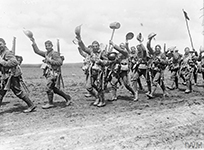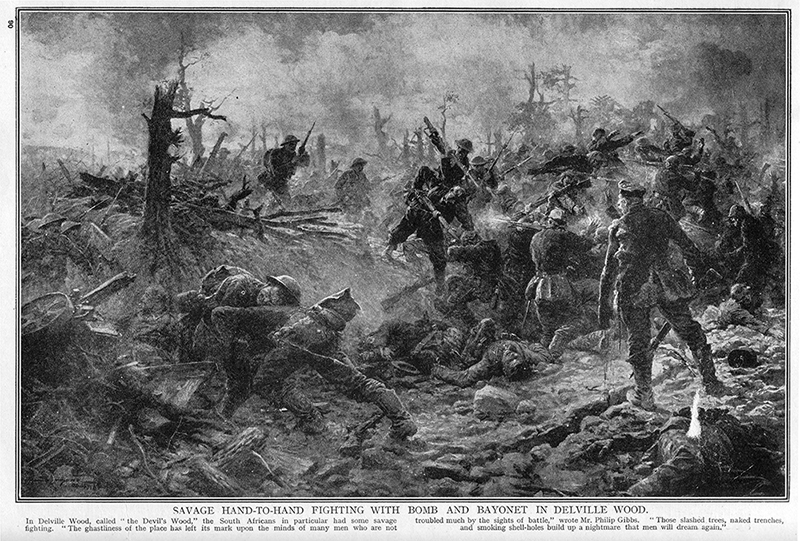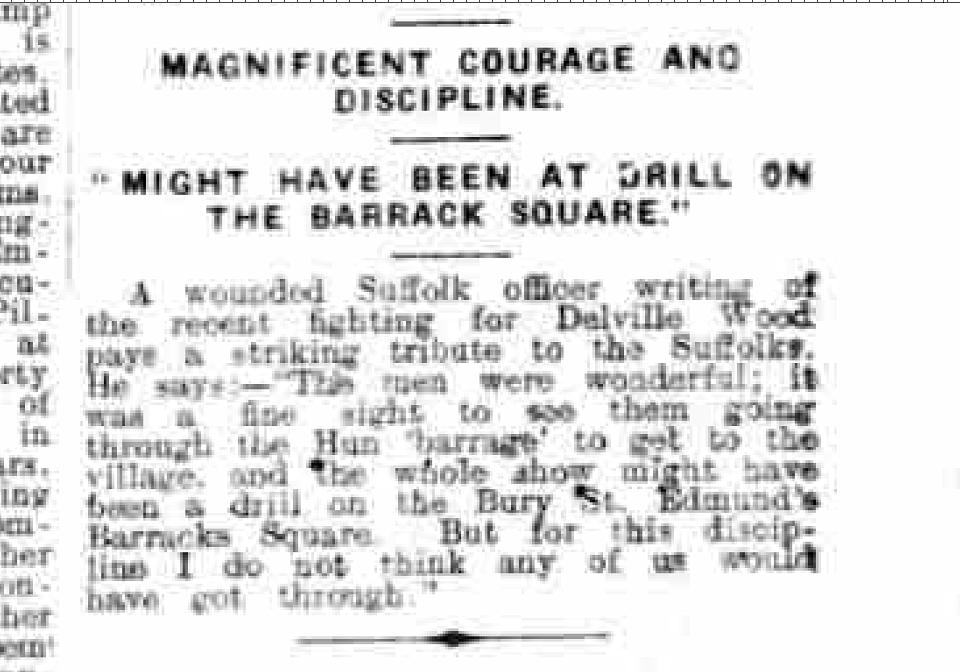
The VIII Corps Collection Station was placed at Acheux in readiness for the Battle of the Somme in 1916 © IWM Q 717
Introduction
Edwin Robert Richmond Peck joined his battalion in France on 20th July 1916. Born on Boxing Day in 1892, educated at the local grammar school in Ipswich, he became a clerk at a brewery on the banks of the river Orwell before signing up for the Suffolk Regiment in 1915.
He was not immediately posted to France, joining the 6th Cyclist Battalion, which was responsible for guarding the east coast of England from the Rivers Deben to the Blythe.
He found conditions a little trying, but was accepting. "I don't care much for sentry duty: too cold holding a rifle in frosty weather. Shall not get it often.". The locals in Louth (where he was billeted in the Town Hall) were hospitable. "Three people here offered me supper, so I had to refuse two." he wrote home to his mother.
By stages all the men in the 6th Battalion volunteered or were drafted to the Western Front. Edwin transferred via the Inns of Court Officers Training Corps in August 1915 based in Berkhamstead. On 20 January 1916 (see London Gazette 20 September 1916 - exactly 50 years before my birth) he became a war-time commissioned officer (Temporary 2nd Lieutenant), and was sent to the 10th battalion, Suffolks at Shoreham, before finally being transferred to the 8th Battalion in France joining them at Bailleul on 20th July 1916.
Edwin was confirmed in his rank on 6th October 1916 along with his friend Charles Clee. I suspect both were in charge of platoons in A Company which was lead by Captain Angier.
Edwin's letters
The 16th September is the first in the collection of letters written by Edwin to his mother when he is stationed in France. They have been passed down from Robert Richmond Peck (my great grandfather and Edwin's father) and are now looked after by my father. They will next pass to my eldest brother, Simon. They are beginning to look rather old and fragile.
Two letters are available from the preceding period - one in November 1915 when Edwin was in training at Louth, Lincolnshire where he reassures his mother "I am having quite a good time and am not a bit sorry I joined, getting used to roughing it now.".
The second is at Shoreham, undated but probably written around April/ May 1916. Edwin is trying to reassure his mother that his Christian principles are intact despite some unnamed activity which takes place on a Sunday (presumably mentioned in a letter which has not survived) . "It did not even occur to me that it was wrong, at all, using the Sunday as I did". Jack (Edwin's brother, my grandfather) too is also on his mother's mind. "As for Jack going to Hippodrome [Variety Show], don't worry at all. His heart is fixed and to my mind such a form of pleasure so necessary to youth will have no evil effect whatsoever.". Florence, Edwin's mother is facing the twin challenges of her sons starting to explore the wider world beyond Ipswich, and their entry into adulthood coinciding with a world war.
In the second letter Edwin mentions Zeppelin damage in Ipswich and that their Easter leave had been cancelled due, he suspects, to the Irish trouble [see Easter rising, April 1916].
8th Battalion, Suffolk Regiment activities before and just after Edwin's arrival in France
The Battle of the Somme started on 1st July 1916, nineteen days before Edwin arrived in France.
The Battalion was held in reserve for the now infamous first offensive on 1st July. At Carnoy they were spectators to one of the heaviest bombardments of the war so far, witnessing the heavy use of British trench-mortar shells designed to cut the enemy's wire. The ensuing attack achieved its objective and the 8th Battalion came out of reserve to hold the new line (war diary describes location as [former] German Trenches, W. of Montauban). In reserve, they survived the first day of the Somme relatively unscathed. They avoided the bloodbath which resulted in more British deaths on one day than during the whole of the Korean, Crimean and Boer wars combined.
The battalion were relieved on the evening of 7th July by the 2nd Battalion Royal Scots and were billeted in a new camp on the Bray-Albert Road. Casualties had remained low (2nd Lieut. Dixey was killed and 5 other ranks (O.R.) were wounded).
They were back in the line again on the 14th July at Bernafay Wood in Chimpanzee Trench where they came under heavy shellfire.
On the 19th July Brigade Major J.C. Markes (Brigade Majors were responsible for all brigade operations and for contact with front line troops) ordered the Battalion to participate at short notice in a hurriedly prepared counter-attack to regain Delville Wood (later described as Devil's work at Delville Wood) and the nearby village of Longueville. The Battalion were to advance in daylight over two miles of open country towards their objective. This was the Battalion's first experience of open warfare.
During this offensive they came under prolonged periods of machine-gun fire and sustained heavy casualties. Markes was killed, and they were ordered to consolidate their hold on parts of the village and woods then under their control. "Captain Lack wounded, also 2nd Lieuts. CF Fousham, H C Crosher, & N C Rawes... B Company had heavy casualties; 2nd Lieut Page killed whilst trying to surround a machine gun...no headway was made despite repeated attempts." (War diary, 19th July)
On the 20th July a fresh attack was launched by the 76th Brigade which also sustained further heavy causalties including the loss of another Brigade Major - W La Touche Congreve D.S.O who was subsequently awarded a posthumous Victoria Cross for repeated acts of conspicuous bravery.
"Captain Wood evacuated with shell shock. The relief of the Battalion by 2nd Bt. The Royal Fusiliers and The Royal Scots Fusiliers commenced and carried out under great difficulties. The entire relief finally completed by 6am July 31st (sic) ." (War diary, 20th July)
Early on the 21st July the 8th Battalion was finally relieved.
The War Diary notes that at the end of 20th July they had a fighting force of approximately 350 men. Casualties in the battalion were 8 officers and 230 other ranks. Based on these figures, when Edwin arrived, 40% of his Battalion had been either wounded or killed in the preceding two days.

Official British Military drawing. First published in "The Great War" (full title- The Great War: The Standard History of the All-Europe Conflict), Ed. H.W. Wilson, 1917
Lessons from the counter attack on Delville Wood and Longueval Village
- A hurried counter attack on a wood or village without any previous reconnaisance and without sufficient artillery preparation on a pre-arranged and methodical plan [will] more often than not [fail to] obtain its ultimate objective...
Edwin's letter dated 16th September 1916 (almost one month later)
Joining the battalion after it was relieved, Edwin tells his mother, on 16th September, "Up to now the time I have spent in France has been most enjoyable and full of new experiences."
This matches what we know from the Battalion's war diary after its involvement in the Battle for Delville Wood.
For the whole of August, and for the early part of September the 8th Battalion saw no action. They were training for three weeks preceding the 8th September, and then during September being meticulously prepared for the next big offensive - an attack on Thiepval Ridge and the Schwaben Redoubt to take place in late September. The battalion was moved up to Forceville on the 18th September, and medals for the "devil's work at Delville Wood" were presented on the 20th September to Major Bull and others.
Edwin describes studying trench maps. The entire battalion was rehearsing on specially prepared trenches that mirrored the actual battleground which was also being reconnoitered whenever possible by the officers (probably not including Edwin). No effort was being spared to avoid repeating the failure to prepare for the preceding battle at Deville Wood.
Edwin admits later to his mother that he knew that his Battalion was about to see action. "Of course I knew all about it" he tells her on 30th September "but not exactly where we were going.". The timing of this letter home, and its content should be seen in this context.
Edwin cannot of course mention battleplans in a letter - especially beforehand, but Edwin is in the eye of a storm, between the deadly Battle for Delville Wood for which he arrives too late to participate, and a day or so before the attack on Thiepval Ridge and the Schwaben Redoubt for which his Battalion has been preparing for the preceding six weeks.
Edwin's mother's responses to his letters are missing and we can only guess at their relationship. One can only hope his optimism, as he contemplates an imminent offensive, brought him and his mother some comfort. His admiring description of his fellow officers; his oblique reference to a forthcoming attack that will "decide things finally", and his assertion that the men are cheerful and optimistic are determinedly upbeat.
Did he feel he was at the start of a great adventure? Was he falling back on Rupert Brooke's old lie to protect himself or his mother? Its impossible to know.
Edwin writes as one who is becoming an adult. "My servant looks after my washing, and sees that I change at the proper time and also that I get up in the morning!!!". Three exclamation marks signal a joke at his own expense - perhaps reassuring his mother that not everything has changed.
His attempt to give her money in lieu of a birthday gift however was not successful. "I should also very much like you to have £1 for your birthday. It will be the first I have given you and not the last.". She rejects his offer telling him to keep his money for himself.
He cannot hide his irritation at his older sister (by one year) now married who he was told had sent a dough cake, which he discovers had not yet been requested from Hereford, where her new husbands family live. Perhaps dough cakes were easier to find in Hereford.
A Company, 8th Suffolks, BEF, France.
My dear mother
I have received both your letter and Olive's and also one from Ivy and will proceed to answer.
No, I am not in the thick of it as yet although we have had some narrow squeaks, so much depends on how things go up the line whether we are called upon or not. A week ago we were ordered to take a certain place but the troops already there managed to do it, so our assistance was not needed. Then we were moved nearer and received orders the next day to relieve a "Coy" in a line of trench, but these orders were cancelled at the last moment.
Next day we marched back to another village a few miles away in the pouring rain [Acheux*1], and there we are now waiting for orders. If you have been following the news lately, it has a special significance for us, and has been good.
Olive said you wanted to know more of my daily routine, well there is not much to tell. As you know the first few weeks out here were spent in rather strenuous training, getting up at 4.30am, marching 4 to 5 miles to a training area and getting back sometimes at 7pm, sometimes at 4pm. Since we have been under orders, and on the move, work has been a negligible quantity.
They billet us in dirty French villages, the mens' billets are really rotten. Ours are quite passable and in some instances quite good, consisting of a room to sleep in and a mess room if we are especially lucky. Some of us get beds, others sleep in their valises. Our food is good. We elect a mess president and he arranges everything. We have a servant each and a cook and they all help in the mess, wait and wash up etc. etc. A [unreadable - looks like LIMBER] carries our utensils, crockery and food etc. and goes on before us, and very soon after we arrive there is a meal for us.
There are eight officers in the company and we pay 40 francs (£2.8s in English money) per month plus 14 francs each for whiskey and port.
In France, water is only used to wash in.
In [our] spare time we look after our platoons. There are four and I have one. We also play a little bridge and solo in the intervals of parades, meals and studying trench maps.
Up till now the time I have spent in France has been very enjoyable and full of new experiences.
My company commander is a very sound man. Captain Angier [later Major Harry Allan Angier, OBE, MC], a relation to Captain Pretyman and Sir Cuthbert Quilter.
The C.O. although only 28 of age is a fine soldier and has done good work. Lt Col. Hill D.S.O. [Lt Col GVW Hill, DSO]
The second in command of the battalion, Major Bull D.S.O. [Major Philip Cecil Bull D.S.O.(1889-1960)] (in today's Gazette) is one of the nicest of men. Ask Olive if he is any relation to Miss Bull of Secondary School.
Now I think I have told you as much as I can and will proceed to answer your letter more directly.
You said that Ivy had sent me a cake, she says she will write to Hereford directly for a dough cake, then send it on. It will probably arrive if not delayed in a month's time. Her mistake I expect.
The socks will be welcome any time, although I am not short. Unfortunately I have had to dump (throw out) my blanket, best tunic, a pair of boots, and perhaps will not see them again. It matters little because if I get wounded I shall probably lose the lot.
We cannot carry more than 50 lbs each in the transport.
My servants looks after my washing, and sees that I change at the proper time and also that I get up in the morning!!!
The weather has been fairly good with some rain lately. The men are extremely cheerful and optimistic, although the favourite topic of conversation out here and in their letters is of home and what they will do when they return, and what they did do before coming out.
Don't you think things are going fine? The next big push will decide things finally.
Well ta.ta. for now. I think you might buy Joan something in case I dont have an opportunity. Anything like £1.
Love to all
Eddie
[Written along the left hand edge of the letter] I should also very much like you to have £1 for your birthday. It will be the first I have given you and not the last.
Bury Free Press - Saturday 05 August 1916

The Halesworth Times and East Suffolk Advertiser. - Tuesday 05 September 1916
References
*1 Acheux: The VIII Corps Collection Station was placed at Acheux in readiness for the Battle of the Somme in 1916 and the graves of July, August and September 1916, in Row A and part of Row B, are the earliest in the cemetery. A few graves in Row B mark the period of eighteen months during which the field ambulances had moved eastwards and the cemetery was little used. The remaining graves cover the period April to August 1918, when the German offensives brought the Allied front line within 8 kilometres of Acheux.